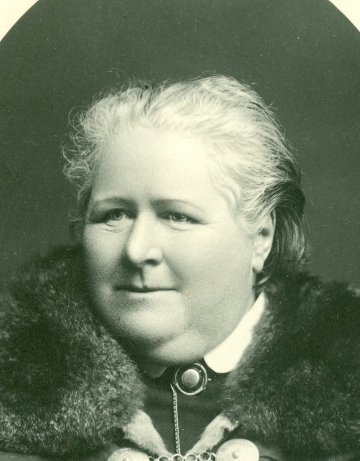Frances Power Cobbe
The full resource is FREE to all registered users of the website
If you are not already registered you can sign up for FREE website access to download the full resource.

- Born: 1822
- Died: 1904
- Occupation: Writer and animal rights campaigner
- Claims to fame: 19th-century Anglo-Irish campaigner for women’s rights, involved in formulating the 1866 women’s suffrage petition.
Early life
Frances was born in Dublin, Ireland, into a wealthy Anglo-Irish family. She found her life as a housekeeper to her father frustrating, but after his death she was able to pursue a career in journalism and to fight for the social and political causes she believed in. Frances was known for being outspoken and wrote many different articles and papers, especially on her passions – women’s rights and animal welfare.
Campaigning
Frances wrote papers such as ‘University Degrees for Women’ in 1862 and was involved with the Married Women’s Property Committee, which sought equality for women within marriage. She was one of the earliest members of the influential Kensington Society in 1865 and was involved in formulating, with them, the 1866 women’s suffrage petition. She was a founding member of the London National Society for Women’s Suffrage (LNSWS) in 1867, but resigned that same year over differences with other committee members.
Her concerns included a fear of the more radical Manchester Branch of the National Society, as she was nervous of giving power to ‘those who were in the habit of turning the world topsy turvy’. While her views on women and animals were perceived by some as radical, she was also a member of the parliamentary Conservative Party and a dame in its women’s ‘Primrose League’, which was disliked by many votes for women campaigners because of its elitist outlook – her social radicalism appears to have been confined to only those that she approved of.
In 1877, Frances published a pamphlet, ‘Why Women Desire the Franchise’, which incisively outlined her arguments in favour of women’s suffrage, as well as tackling objections to it. They are summarised here:
- All those who have property and pay taxes should have the right to political power – inclusive of gender.
- To deny intelligent qualified women is detrimental to the whole of society as it means losing those who can also work for the cause of justice and public order.
- To exclude women from the Governmental debate is to have them misrepresented by men, which means their issues are not taken seriously.
- Because, while the natural and artificial disabilities of women demand in their behalf the special aid and protection of the State, no proposal has ever been made to deal with their perils and difficulties; nor even to relieve them of the smallest portion of the burden of taxation, which they are compelled to bear without sharing the privileges attached thereto.
- Because women, by the denial to them of the franchise, are placed at a serious disadvantage in competition for numerous offices and employments; especially women of the middle class, whose inability to vote tends extensively to deter landlords interested in politics from accepting them as tenants, even in cases where they have long conducted for their deceased male relatives the business of the farms, shops, to whose tenure they seek to succeed.
- Because the denial of women of the direct exercise of political judgment allows men to undervalue their opinions on all the graver matters of life.
- Because being taken seriously forces women to adopt beguiling and underhand actions to exert influence as open and honest exercise has been refused.
- Finally, we desire the franchise for women, because, while believing that men and women have different work to do in life, we still hold that, in the choice of political representatives, they have the same task to accomplish; namely, the joint election of a Senate which shall guard with equal care the rights of both sexes, and which shall embody in its laws that true Justice which shall approve itself not only to the strong, but also the weak.
In addition to campaigning for women Frances also campaigned on animal welfare, and she was a vehement anti-vivisection campaigner. Between 1860 and 1910, the anti-vivisection movement was one of the strongest debates of the day, which led to the Cruelty to Animals Act in 1867. In the following year, Frances set up the National Anti-Vivisection Society.
Glossary
- Vivisection: This is the practice of experimenting (often cruelly and without anaesthetic) on animals.
- Kensington Society: This was one of the first campaigning groups for women’s suffrage.
Questions
- Does it appear that Frances was supportive of all women’s rights or only in favour of some issues?
- Frances had died before the suffragettes carried out their militant actions – do you think she would have approved of them?
- Which of Frances’s eight points do you think are the most important?
